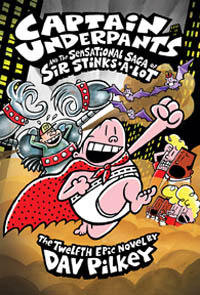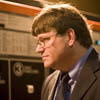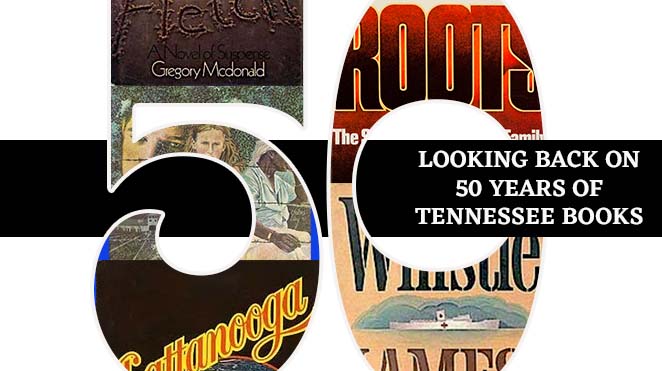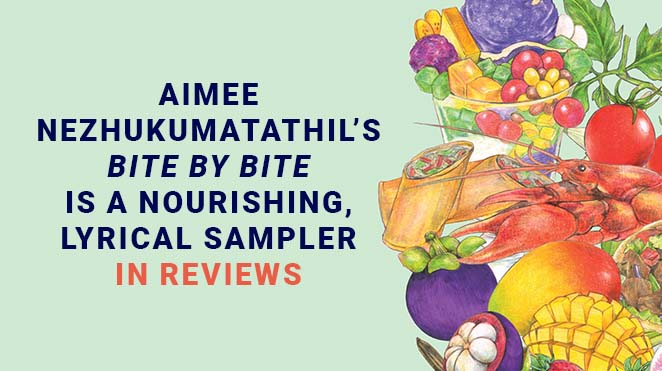The Russian literary critic Mikhail Bakhtin argued that great fiction is “carnivalesque.” Like the medieval Feast of Fools, it subverts the social order in comic and profane ways, allowing kings to become peasants and peasants kings—as when, for example, a really mean elementary-school principal is forced, with a simple snap of the fingers, to strip off his clothing, jump out a window in his underwear, and act like a cheerful superhero. Bakhtin wrote about the likes of Rabelais and Dostoyevsky; the principal in underwear comes from the brilliant, devious mind of Dav Pilkey.
 Captain Underpants, known to children far and wide, is controlled by a couple of lovable pranksters named Harold and George. Whenever the captain is flying, there’s no question that the world of Jerome Horwitz Elementary School has been turned upside down. In Captain Underpants and the Sensational Sir Stinks-A-Lot, the twelfth “epic novel” in the series, a gym teacher named Mr. Meaner swallows a tiny piece of a destroyed planet, becoming, naturally, an evil genius. Before the story is underway, however, the narrator issues a warning that “these books have been criticized for their inappropriate language” by grumpy old people (GOP for short) and that in deference to them words like “heck,” “tinkle,” “fart,” and “pee-pee” have been removed, while references to Bob Evans restaurants, hard candies, and FOX News have been inserted. And that’s when things begin to get carnivalesque, in the manner of all great fiction.
Captain Underpants, known to children far and wide, is controlled by a couple of lovable pranksters named Harold and George. Whenever the captain is flying, there’s no question that the world of Jerome Horwitz Elementary School has been turned upside down. In Captain Underpants and the Sensational Sir Stinks-A-Lot, the twelfth “epic novel” in the series, a gym teacher named Mr. Meaner swallows a tiny piece of a destroyed planet, becoming, naturally, an evil genius. Before the story is underway, however, the narrator issues a warning that “these books have been criticized for their inappropriate language” by grumpy old people (GOP for short) and that in deference to them words like “heck,” “tinkle,” “fart,” and “pee-pee” have been removed, while references to Bob Evans restaurants, hard candies, and FOX News have been inserted. And that’s when things begin to get carnivalesque, in the manner of all great fiction.
In advance of his appearance at the Nashville Public Library, Pilkey recently answered questions from Chapter 16 via email:
Chapter 16: The first Captain Underpants book was published nearly twenty years ago. That’s a lot of rearranged signs and incredibly graphic Flip-O-Ramas. How have you and the series evolved together?
Dav Pilkey: Many of my original fans are now in their late twenties, so I have tried to expand the scope of the stories to include more complex and sophisticated ideas. The later books have time paradigms, overlapping multiple universes, and a smattering of quantum physics. I actually had to do research and consult with experts for some of the later books. As silly as the stories are, I still wanted them to be grounded in scientific accuracy.
Chapter 16: You’ve talked and written about creating comics when you were young. Which comics-creators influenced you most over the years?
 Pilkey: My biggest influences are Charles M. Schulz and Ernie Bushmiller. Schulz taught me how to draw, and Bushmiller taught me how to construct a gag.
Pilkey: My biggest influences are Charles M. Schulz and Ernie Bushmiller. Schulz taught me how to draw, and Bushmiller taught me how to construct a gag.
Chapter 16: Why are booger and fart jokes so eternally funny?
Pilkey: I believe it’s because the adults in our lives talk so openly about these things when we’re two to four years old. At this time in our lives, many of our conversations revolve around potty training and bodily discharges. However, when we get to a certain age—usually around five—we’re forbidden from ever talking about these things again. Adults get very upset about these topics, and I think the combination of adult hypocrisy and kid empowerment elicits laughter in children. Some of us never grow tired of this.
Chapter 16: The new book gives Harold and George a glimpse of their future selves. If a young version of yourself showed up at your door in a robo-squid suit, what would you say to him?
Pilkey: “Don’t worry so much. Just be yourself and everything will turn out fine.”
Chapter 16: Much of the humor in the series seems aimed at adults, such as wonderfully awful puns on ‘70s song lyrics and some fairly sophisticated social commentary. Have you considered writing graphic novels specifically for adults?
Pilkey: Thank you. I tend to identify more with my nine-to-twelve-year-old audience, so I currently don’t have plans to write for adults. I am, however, working on a chapter-book/graphic-novel hybrid for older kids (middle graders to young adults).
Chapter 16: You have talked in previous interviews about the amount of mail and comics you receive from young fans. Now that a generation of readers has grown up with Captain Underpants, do you hear from adults who started reading as kids? If so, what do they say about the impact Harold and George had on their lives?
Pilkey: Nearly every day I hear from someone who was at one time a reluctant reader, and Captain Underpants was the book that changed everything for them. Some of those former reluctant readers have grown to become physicists, university professors, animators, writers, and librarians. It’s truly humbling how one silly book can start a kid down the pathway toward literacy.
Chapter 16: The Paperboy became a Caldecott Honor Book the same year Captain Underpants appeared and remains a popular picture book for young readers. While the world’s Poopypants must certainly be defeated in the future, do you ever think about revisiting realistic picture stories?
Pilkey: This year marks my return to picture books, with the November 3rd release of One Today (Little, Brown). The text, by acclaimed inaugural poet Richard Blanco, is one of the most beautiful and mesmerizing poems I’ve ever read.
Chapter 16: What’s the current status of the Captain Underpants movie?
Pilkey: Dreamworks Animation is producing, and David Soren (creator of the film Turbo) is directing. It’s currently scheduled to be released in 2017.

Michael Ray Taylor teaches journalism at Henderson State University in Arkadelphia, Arkansas. He is the author of several books of nonfiction and coauthor of a forthcoming textbook, Creating Comics as Journalism, Memoir and Nonfiction.
Tagged: Children & YA





